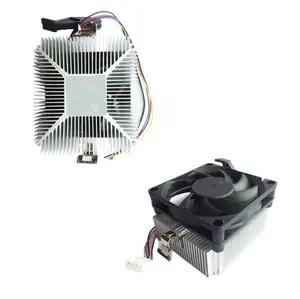CPU Fan Essentials: An Overview
The term cpu fan in the context of computer hardware refers to the cooling devices integrated within or attached to the central processing unit (CPU) to dissipate heat. As the CPU operates, it generates significant heat, which, if not properly managed, can lead to reduced performance or damage. CPU fans are thus critical components in maintaining the optimal functioning of computer systems.
Types and Applications of CPU Fans
From the fan in computer setups to specialized cooling fan in cpu systems, these components vary widely. They range from basic air-cooled heatsinks to advanced 120mm all in one liquid cpu cooler units. The choice of a CPU fan depends on the specific needs of the system, whether it's a simple office desktop or a high-performance gaming rig. In larger setups, such as servers, multiple fans in pc case configurations ensure a comprehensive cooling solution.
Features and Materials
The construction of a CPU fan often involves a combination of a heat sink fan in computer and sometimes a heatsink in cpu, made from materials with high thermal conductivity like aluminum or copper. Advanced cooling solutions, such as the asus rog ryujin 360 all in one liquid cpu cooler, incorporate a liquid cooling mechanism for more efficient heat dissipation. The design of these systems ensures that they fit seamlessly onto the cpu fan in motherboard, providing targeted cooling to the processor.
Advantages of Effective CPU Cooling
Effective cooling, provided by a cooling fan in computer, is not just about preventing overheating. It also contributes to the longevity of the CPU and maintains system stability. For instance, a processor fan in computer can significantly reduce the risk of thermal throttling, which is when a CPU reduces its speed to avoid overheating, leading to a drop in performance.
Choosing the Right CPU Fan
Selecting the appropriate CPU fan requires understanding the thermal demands of the CPU and the physical space within the case. For example, a sys fan in motherboard is typically smaller and designed to fit within the confines of the system, while an evga clc 120mm all in one cpu liquid cooler might be chosen for its superior cooling capabilities in more spacious cases.
Conclusion
In conclusion, the cpu fan in a computer system is a pivotal component that ensures the smooth operation and durability of the CPU. With a variety of types and technologies available, from air-cooled fans to sophisticated liquid cooling systems, it is essential to select a cooling solution that aligns with the specific requirements of the computer's CPU and chassis.










































 浙公网安备 33010002000092号
浙公网安备 33010002000092号 浙B2-20120091-4
浙B2-20120091-4